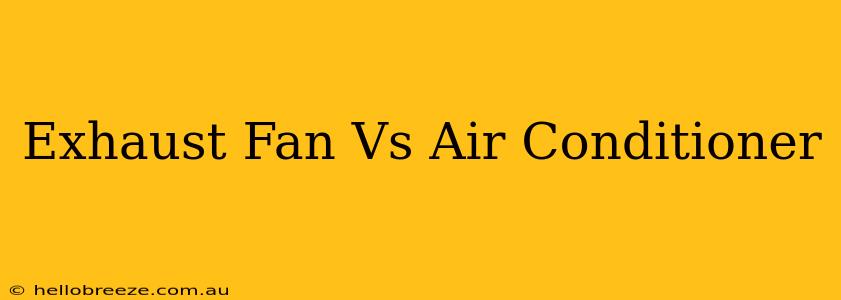Choosing between an exhaust fan and an air conditioner can be tricky. Both aim to improve indoor comfort, but they achieve this in vastly different ways. Understanding their strengths and weaknesses will help you decide which is best suited for your needs and budget.
Exhaust Fans: For Ventilation and Spot Cooling
Exhaust fans are primarily designed for ventilation. They work by removing stale, hot, or humid air from a room, drawing in fresh air from outside or other areas of the house. This makes them highly effective for:
- Bathrooms and Kitchens: Removing moisture and odors from these areas is crucial for preventing mold and mildew growth and maintaining a pleasant atmosphere.
- Improving Air Quality: By expelling pollutants and stagnant air, exhaust fans contribute to better indoor air quality.
- Reducing Humidity: Especially beneficial in humid climates, exhaust fans can help combat excessive moisture.
- Spot Cooling: While not a primary function, exhaust fans can contribute to a slightly cooler feeling by removing hot air.
However, exhaust fans have limitations:
- They don't cool the entire space: They primarily focus on removing air, not reducing the overall temperature.
- They rely on outside air: If the outside air is hot or humid, the effectiveness is reduced.
- They can be noisy: Some models can be quite loud, particularly older or less efficient ones.
- Limited Cooling Capacity: They are not a replacement for air conditioning when dealing with extreme heat.
Air Conditioners: For Whole-Room Cooling and Temperature Control
Air conditioners are designed for whole-room cooling and temperature regulation. They use refrigeration to lower the temperature of the air, providing a consistent and comfortable environment. This makes them ideal for:
- Maintaining a Comfortable Temperature: Air conditioners offer precise temperature control, keeping your space cool regardless of the outside temperature.
- Whole-House Cooling: Central air conditioning systems offer comprehensive cooling for your entire home.
- Improved Sleep Quality: A cool, comfortable bedroom leads to better sleep.
- Enhanced Productivity: A cool workspace can improve focus and productivity.
But air conditioners also come with downsides:
- Higher Initial Cost: Air conditioners, particularly central systems, have a significantly higher upfront cost than exhaust fans.
- Energy Consumption: They use a considerable amount of energy, leading to higher electricity bills.
- Maintenance: Regular maintenance, including filter changes and professional servicing, is necessary.
- Environmental Impact: The refrigerants used in air conditioners can have an impact on the environment.
Exhaust Fan vs. Air Conditioner: The Ultimate Comparison
| Feature | Exhaust Fan | Air Conditioner |
|---|---|---|
| Primary Function | Ventilation & Spot Cooling | Whole-Room Cooling & Temperature Control |
| Cost | Low | High |
| Energy Use | Low | High |
| Maintenance | Minimal | Moderate to High |
| Cooling Capacity | Limited, localized | High, whole-room |
| Noise Level | Can be noisy | Varies, generally quieter than older models |
Choosing the Right Option
The best choice depends entirely on your needs and priorities.
- Choose an exhaust fan if: You need ventilation in a specific area (bathroom, kitchen), you have a small budget, and you live in a climate with moderate temperatures.
- Choose an air conditioner if: You need to cool an entire room or house, you want precise temperature control, and you're willing to invest in a more expensive and energy-consuming solution.
In some cases, combining an exhaust fan and an air conditioner might be the most effective solution. An exhaust fan can help supplement your air conditioning by removing humid air, increasing efficiency and improving comfort. Consider your individual climate, budget, and cooling needs to make the most informed decision.

